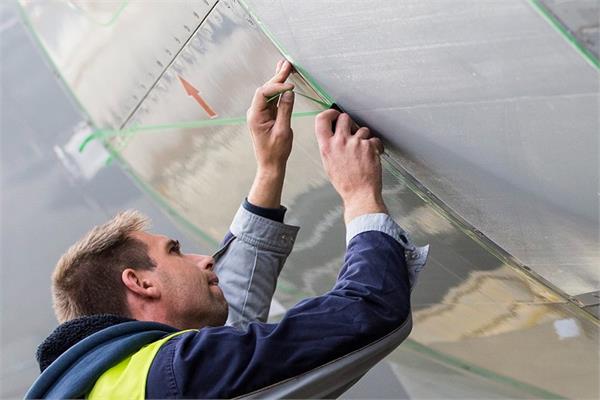
The riblet films jointly developed by BASF and Lufthansa will be applied on the entire SWISS’ Boeing 777-300ER fleet.
The passenger airline Swiss International Air Lines (SWISS) has announced that it is planning to equip its entire Boeing 777-300ER long-haul fleet with the fuel-saving AeroSHARK surface technology developed by BASF and Lufthansa. A total of twelve airplanes will gradually be fitted with the riblet films to reduce frictional resistance, making the sub-fleet 1.1% more fuel-efficient.
The AeroSHARK technology will allow the company to save more than 4,800 tons of kerosene and 15,200 tons of carbon dioxide annually, the equivalent of around ninety long-haul flights from Zurich to Mumbai.
SWISS had already supported BASF and Lufthansa Technik for the development of AeroSHARK: In 2021, a Boeing 777 wing was measured for the entire duration of a regularly scheduled flight between Zurich and San Francisco and, with the data collected, Lufthansa Technik has been subsequently able to create highly accurate 3D models for flow simulations.
“Reducing our environmental footprint is one of the biggest challenges facing the aviation industry, and becoming carbon-neutral until 2050 is an important strategic goal for SWISS. We are keen to actively promote and invest in the use of new technologies. We are pleased to be the world's first passenger airline to offer the innovative AeroSHARK technology on our Boeing 777 fleet, making another important contribution to more sustainable air travel in the future,” stated Dieter Vranckx, the CEO of SWISS.
“Due to the long lifecycles in our industry, we cannot only rely on new aircraft generations to reduce our environmental footprint, but also need to specifically optimize existing fleets towards sustainability. AeroSHARK makes a significant contribution to this, and I am very pleased that SWISS is leading the way,” explained Dr. Johannes Bussmann, the CEO of Lufthansa Technik.
“In developing our Novaflex Sharkskin surfaces, the focus was on a robust yet functional solution that meets the stringent requirements of aviation and also helps our customers achieve their sustainability goals. The fact that SWISS is convinced by our solution shows that economic action and sustainability go hand in hand,” added Uta Holzenkamp, the head of BASF's Coatings division.
SWISS will also provide one of its aircraft for the STC flight, in order to obtain the required Supplemental Type Certificate from the European Union Aviation Safety Agency (EASA).